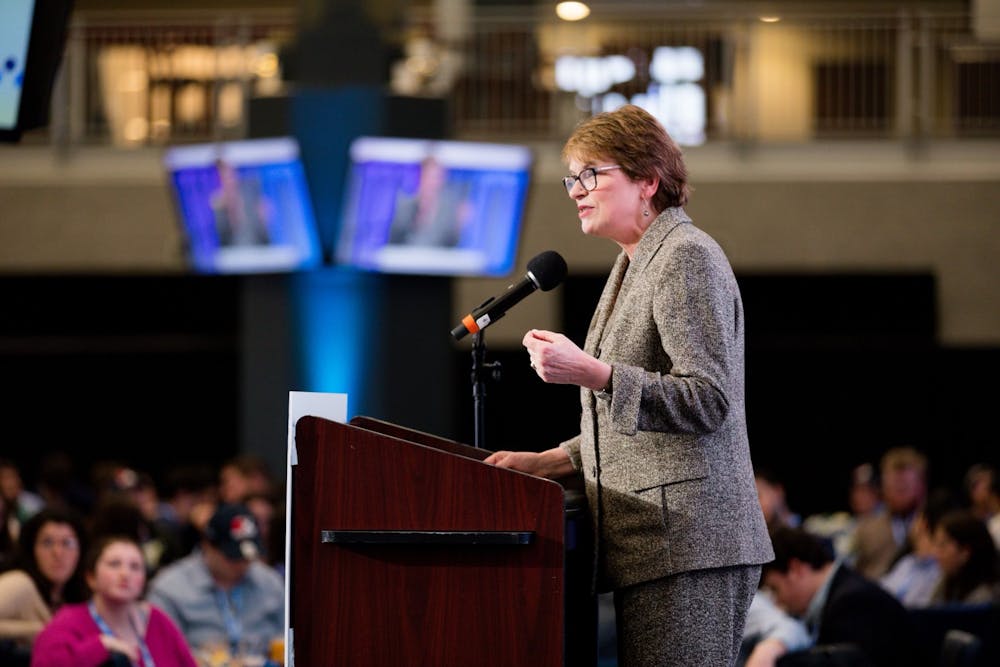President Christina Paxson P’19 P’MD’20 advocated for maintaining freedom of expression, diversity and inclusion on college campuses as part of the Hillel International Israel Summit East 2023 on Sunday, Feb. 19. The summit invited 250 Jewish college students to Foxborough, Mass. to engage in conversations with Israel experts and build connections with students from other university campuses.
In her speech titled “Uplifting the Values of Inclusion and Freedom of Expression on a College Campus,” Paxson shared her perspective on how universities should encourage open dialogue on contentious issues such as Israel-Palestine.
“Universities are at their very best when they welcome and support individuals from the (widest) possible range of backgrounds, experiences and viewpoints, who learn from and inform each other through the free exchange of ideas,” Paxson said.
This “can expose stark divides and produce heated disagreements, just as it can generate shared understandings and new insights into the most complex issues facing the world,” she added.
Paxson did not take a formal stance on issues related to Israel-Palestine in the speech, as she said that this “would undermine Brown’s primary mission of advancing knowledge and understanding.”
“Rather than taking sides, the appropriate role of a university is to curate opportunities for students and scholars to study, discuss and debate the hardest of issues,” she said.
Paxson also addressed the rise of antisemitism on university campuses, urging audience members to discuss antisemitism both within and beyond the classroom to ensure “that the concerns of Jewish students are heard” and that antisemitic behavior does not persist on their campuses.
The bicoastal summit, which originated from the Harvard Israel Summit, brings together “pro-Israel” student leaders from universities “to learn (and) hear from speakers in the Israel sphere,” said Jillian Lederman ’24, president of Brown Students for Israel and a student organizer of the summit.
Lederman said she reached out to Paxson about speaking at the summit after the conference’s leadership team expressed interest in including a “representative of higher education.” After several conversations with Lederman, Paxson agreed to speak at the summit.
“I was really impressed with the speech,” Lederman said. Having Paxson “come and speak on such a fraught subject matter means a lot, and the fact that she wasn’t willing to take a stance on (the issue) I think made her message clear and resonated with a lot of students.”
Paxson’s presence at the summit was, “in a lot of ways, a symbol of the fact that we can have dialogue on these issues,” Lederman said.
But other Israel-Palestine advocacy groups on campus, while welcoming some of the sentiments in Paxson’s speech, urged her to take a stance.
In a statement sent to The Herald by email, Students for Justice in Palestine wrote that the organization rejects “the idea that there are ‘two sides’ to whether or not Palestinians deserve basic human rights and dignity.”
J Street U Brown’s executive board wrote in an email to The Herald that while they appreciated Paxson’s focus on “values of democracy, healthy discourse and opposing anti-semitism,” the group was disappointed by the lack of progressive voices at the summit during a time “when democracy and free speech themselves are under serious threat.” JSUB is a chapter of a national student movement advocating for a two-state solution to Israel-Palestine.
“We hope that President Paxson and others at last weekend’s Israel Summit will join us … in condemning annexation and violence against Palestinians, and stand up for democracy and human rights for everyone,” the executive board wrote.
In her speech, Paxson also stated that Brown does “not participate in academic boycotts against any country … (and rejects) calls to use our endowment as a tool for political advocacy,” as this would be “antithetical to freedom of expression and the advancement of knowledge.”
“The endowment is inherently a political instrument,” the SJP statement said. “To invest in companies that perpetrate and profit from human rights abuses in Palestine is to assert a political position.”
The statement additionally noted that both undergraduate and graduate students have passed referendums calling for divestment from Israel-affiliated companies in the endowment. The University’s Advisory Committee on Corporate Responsibility in Investment Policies, a previous committee made up of faculty, staff, alumni and graduate and undergraduate students, also released a report in March 2020 recommending that the University divest from “any company that profits from the Israeli occupation of Palestinian land.” The committee was succeeded by the Advisory Committee on University Resources Management.
“Paxson’s commitment to overturning democratic consensus in the name of ‘dialogue’ sets the deadly precedent that both human rights in Palestine and Brown students’ ability to voice their collective will are up for debate,” SJP wrote.

Sam Levine is a University News editor from Brooklyn, New York covering on-campus activism. He is a senior concentrating in International and Public Affairs.





